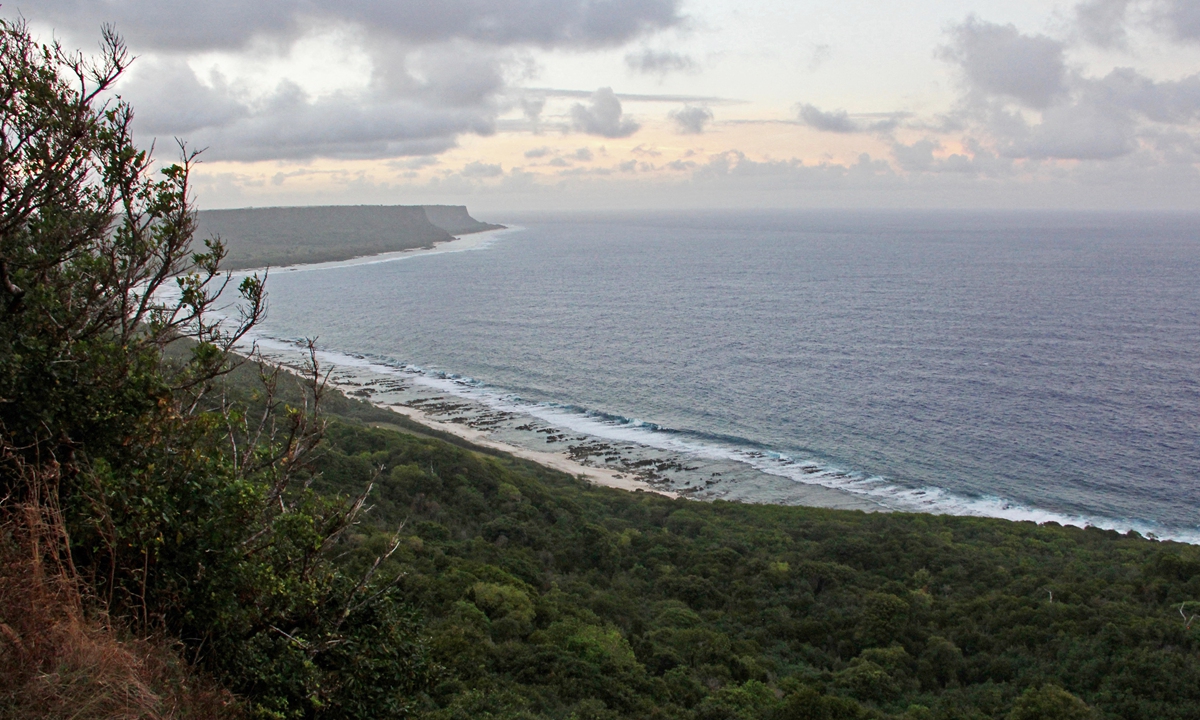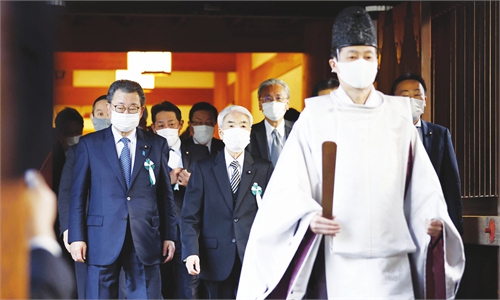
A general view out to the Pacific Ocean from Andersen Air Force Base in Guam, on February 8, 2018.Photo:AFP
In the smear campaign against China using unfounded charges, Guam, lying at the hub of the "second island chain" and regarded by the US military as the "heart of the Pacific," has become the latest hotspot issue for Washington to hype. According to US media reports, the Pentagon is vastly upgrading Guam's air and missile defenses, the reason is its current defense capabilities are "insufficient to deal with a full-scale missile attack by China." In a bid to create a sense of urgency, Vice Admiral Jon Hill, head of the US Missile Defense Agency, presented a schedule, claiming that at least some additional defenses should be built in place by 2026.At the same time, a rather sensational remark has appeared more frequently in the US media's reports on Guam. Many people claim that "Pearl Harbor incident cannot be allowed to happen again" referring to the possibility that the Chinese People's Liberation Army could conduct a "sneak attack" on Guam and destroy the US military forces on the island. Agencies like the Pentagon, FBI, CIA are all masters at fabricating "China horror stories," and they excel at asking for more budget for their departments in this manner. US' fiscal 2023 defense budget request reportedly includes $892 million for the defense of Guam.
We have also noticed that among the "main forces" advocating that "China may attack Guam," conservative think tanks such as the Hudson Institute play very hard. It is an open fact that this institute has received funding from the Democratic Progressive Party authorities of Taiwan for a long time. It cannot be ruled out that there is a driving force behind it in an attempt to create the public opinion that "the US military must help defend Taiwan."
Guam, which the US seized from Spain through war in 1898, is now an overseas territory of the US, with bases for the US Air Force, Navy and Marine Corps on the island. Guam is nearly 10,000 kilometers away from the mainland of the US, and only about 2,700 kilometers away from Taiwan Island. The importance and vulnerability of this location are like two sides of a coin. The two features are even more prominent when the US is scheming to strengthen its strategic suppression of China.
Judging from the deployment that the US military advances, it wants Guam to become a spear for striking China, but at the same time it is worried that Guam will become an immovable target of the PLA, so it needs to speed up its efforts to build Guam into a shield. In reality, this does constitute a set of prominent contradictions. The more the US military wants to suppress the PLA, the stronger its sense of insecurity will be. It definitely cannot be resolved by continuously expanding armaments and preparing for war, but will only be strengthened.
China has no intention of fighting a war with the US, and it is even less likely that China would carry out an undeclared war by conducting a sneak attack like Japan did. Americans can rest assured on this. But if the US military really intervenes in Taiwan affairs by force, it is then taking the initiative to have an armed confrontation with China, and we will definitely fight back without hesitation. US military bases, including Guam, are naturally within the PLA's firepower range. The Taiwan question is entirely China's internal affairs. If such scenario happens, fundamentally speaking, the US military is conducting an act of aggression, and we are justified self-defense. This is the exact opposite of the nature of the attack on Pearl Harbor.
Whether Guam is safe or not ultimately depends on what role Washington wants to play there. Technically speaking, the characteristics of the anti-missile system itself determine that no matter how dense it is, its interception effect will be limited. The US military's remaking and upgrading of Guam can be considered "spiritual comfort" at best. If Washington wants to truly resolve its inner unease, there is actually only one way: to completely dispel the idea of provoking China, and not to regard Guam as a "new front line against China." Today, Washington often talks about crisis control, but can't help but strike a match by the powder keg that it makes. It should know that the real control is to stop any act of playing with fire.
Even today, the attack on Pearl Harbor is still regarded as a "national humiliation" by many Americans. On December 7 last year, the 80th anniversary of the attack on Pearl Harbor, nearly 100 Japanese right-wing lawmakers visited Yasukuni Shrine, which enshrines some Japan's infamous Class-A war criminals of World War II. The signal sent is almost self-evident. But Washington, which is extremely sensitive and narrow-minded to China, has shown connivance for Japan's provocative behavior. The impulse of the Japanese right-wing forces to break through the post-WWII system has been unstoppable, and this is one of the biggest risks facing the Asia-Pacific. How serious are the consequences of finding the wrong enemy? History has given us inspirations and lessons too many times.


